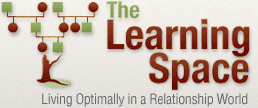The Learning Space Blog
Increase Your Wealth and Health
Recently, I had the opportunity to conduct a retreat, Increase Your Wealth and Health, at the King George Zen Farm. The retreat was designed to increase awareness about our emotional relationship with money.
We all have both a factual and an emotional relationship to money. However, when anxiety goes up, our automatic emotional beliefs and assumptions can take over so that the facts get lost. Some emotional beliefs are: “I never have enough money.” or “If I had more money, I would be safe, happy or calm.” Of course, our money facts are easy to track. We know what comes in and we know what goes out.
The following is a list of questions I developed to help participants broaden their thinking about money. Included in these questions is the assumption that we acquire our automatic emotional beliefs and assumptions from our multi-generational family emotional process. One way of being a self with money is to examine the bigger multi-generational picture. Best thinking to you!
The smaller your focus, the more negative you get
-Loretta Nowakowski, Ph.D.
(or focusing on what you don’t have produces less, not more)
Questions to consider to broaden your thinking about money:
- What does financial health mean to you?
- When have you experienced financial health?
- When and how did you become independently financially responsible for your basic survival needs?
- What did your parents teach you about financial health? Money management? Was it talked about in your family?
- What were your parent’s beliefs about money? Your grandparents?
- What did your family teach you about generosity? What are your criteria for giving money to family members or charitable organizations?
- How anxious do you become when thinking about your current financial situation?
- How anxious do you feel when discussing finances with your spouse, your parents, or your children?
- To what extent is fear present when making financial decisions?
- When you get anxious, do you overspend? Avoid dealing with money by letting bills pile up or not looking at bank records or investments? Do you get critical of your spouse’s spending habits, or your children or parents? Do you compartmentalize expenses and purchases as though they are not related to your overall financial facts?
- What do you do to manage anxiety? When are you happiest? Most calm? Most at peace?
Most of us feel studk and without options when we get anxious about our money. Changing our thinking by examining our assumptions and family patterns can create new and creative solutions for our financial challenges.
Filed under Family, Bowen family systems theory
1 comment for "Increase Your Wealth and Health"
Blog Categories
Blog Archive
- June 2019
- December 2018
- October 2018
- June 2017
- February 2017
- July 2016
- February 2016
- November 2015
- August 2015
- June 2015
- April 2015
- February 2015
- December 2014
- October 2014
- September 2014
- August 2014
- July 2014
- June 2014
- May 2014
- April 2014
- March 2014
- December 2013
- October 2013
- August 2013
- July 2013
- June 2013
- April 2013
- February 2013
- January 2013
- December 2012
- August 2012
- July 2012
- June 2012
- March 2012
- February 2012
- January 2012
- December 2011
- November 2011
- October 2011
- September 2011
- August 2011
- July 2011
- June 2011
- May 2011
- March 2011
- January 2011
- December 2010
- November 2010
- October 2010
- September 2010
- May 2010
About the Learning Space
"The Learning Space is a creative, energetic thinking space for individuals striving to live optimally in all their most important relationships. The Learning Space provides a conceptual space—a place to consider and experience alternate ways of relating."
Read More »
Upcoming Events
view events »Newsletter
Fill out the form below to subscribe to The Learning Space's quarterly newsletter, and get exclusive invitations to special learning forums and other events.


As the co-host of this seminar I think that the day generated many questions and ideas among the participants. The overarching theme for folks seemed to be the boundaries that each can use to discipline ourselves to be aware of even our smallest decisions and how they impact others. observation of minor reactivities can b a link to understanding self.